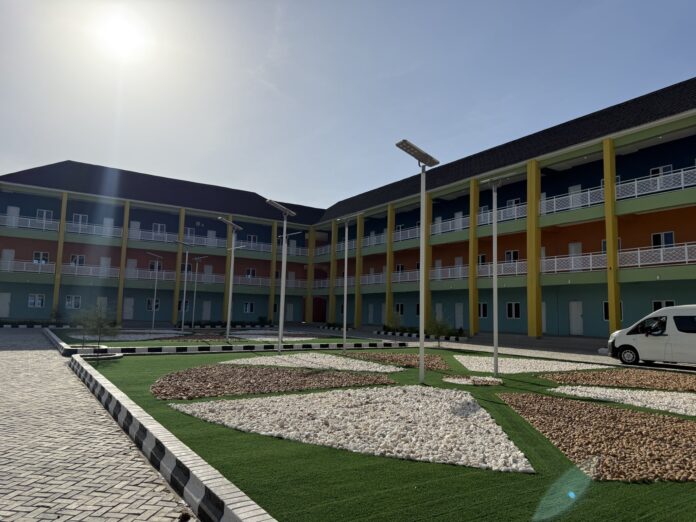By:Abdullahi Inuwa
In what has been described as one of the most ambitious educational development drives in Northern Nigeria, the Borno State Government, under the leadership of Governor Babagana Umara Zulum, has successfully completed 104 mega schools, with an additional 36 still under construction across the state.
These mega schools, each equipped with modern classrooms, science laboratories, and ICT facilities, are part of Governor Zulum’s broader vision to rebuild and transform Borno’s education sector — one that suffered massive devastation during the years of Boko Haram insurgency.
The newly completed schools, spread across urban and rural areas, symbolize a turning point in the state’s post-conflict recovery and reflect Zulum’s deep belief that education remains the strongest weapon against poverty, insecurity, and social disintegration.
A New Dawn for Education in Borno
Governor Zulum, a university professor before joining politics, has made education the cornerstone of his administration’s developmental agenda. Since assuming office, he has consistently championed the reconstruction of destroyed schools, the establishment of new ones, and the training and recruitment of teachers.
Speaking during the commissioning of one of the newly completed schools in Maiduguri — named President Bola Ahmed Tinubu Mega School — the governor reaffirmed his administration’s commitment to rebuilding the foundation of education in Borno.
“This is not just about building schools,” Zulum said. “It is about building the future of our children and our state. Every classroom we complete, every child we keep in school, is a victory against illiteracy, poverty, and the violent ideologies that once held our people hostage.”
State-of-the-Art Facilities for Modern Learning
Each of the mega schools is designed to accommodate between 1,500 and 2,000 students and features 35 fully furnished classrooms, administrative offices, modern science and ICT laboratories, and well-stocked libraries.
In addition, the schools have been built with facilities that ensure inclusivity and safety, including ramps for physically challenged students, boreholes for clean water, perimeter fencing, and solar power systems. The ICT labs are equipped with internet connectivity and computers to expose students to digital learning and prepare them for global competitiveness.
Governor Zulum explained that the schools are strategically distributed across the 27 local government areas of the state to ensure that children from both urban and rural communities have access to quality education.
“We have taken deliberate steps to bridge the educational gap between rural and urban areas,” he said. “Every child, regardless of background or circumstance, deserves access to modern learning facilities.”
Bridging the Educational Gap After Conflict
Borno State was once at the epicenter of Boko Haram’s insurgency, a conflict that led to the destruction of over 900 schools and the displacement of thousands of teachers and students. For nearly a decade, many children in the state were deprived of formal education, particularly in rural communities.
However, since Governor Zulum assumed office in 2019, the narrative has been changing. His administration has built hundreds of classrooms, rehabilitated damaged school structures, distributed educational materials, and introduced welfare programs such as school feeding to encourage attendance.
The mega school initiative is now seen as the boldest effort yet to restore confidence in the public education system. Each facility is expected to serve as a model school, promoting discipline, innovation, and quality instruction.
Named in Honour of President Bola Ahmed Tinubu
One of the most recently completed projects, the President Bola Ahmed Tinubu Mega School, was commissioned in Maiduguri to honour Nigeria’s current leader and to celebrate his commitment to national development through education.
The school, like others under Zulum’s plan, features 35 classrooms, laboratories, ICT centres, and a well-equipped library. The facility also includes teachers’ quarters, an assembly ground, and recreational spaces for extracurricular activities.
Governor Zulum said the decision to name the school after President Tinubu was “a gesture of respect and recognition of his leadership and his administration’s Renewed Hope Agenda, which prioritizes human capital development.”
Stakeholders Commend Zulum’s Vision
Education stakeholders, community leaders, and development partners have lauded Governor Zulum’s leadership and foresight. Many describe his education reform as a model for other states to emulate.
The Borno State Commissioner for Education, Engr. Lawan Wakilbe, noted that the mega school initiative was more than just physical construction — it is about creating an enabling environment for learning and transforming the lives of thousands of children affected by conflict.
“Governor Zulum’s vision is holistic,” Wakilbe said. “He is not only building schools but also ensuring that teachers are well trained, materials are available, and learning conditions are conducive. This is the kind of leadership that rebuilds nations.”
A Beacon of Hope for the Future
For residents across Borno State, the mega schools have become symbols of renewal and hope. Parents who once feared for their children’s future due to insecurity and displacement now see education as a pathway to stability and empowerment.
A parent, Aisha Mohammed, expressed joy as her two children enrolled in one of the newly completed schools in Konduga. “Before now, we had to travel far for them to attend classes,” she said. “Today, they have a beautiful school close to home, with computers and laboratories. This is something we never imagined possible.”
Sustaining the Momentum
Despite the successes, Governor Zulum acknowledged that the work is far from over. He stressed that sustaining educational progress requires community involvement, security, and continued investment in teacher development.
“We must protect these schools and ensure they serve their purpose for generations to come,” Zulum said. “Education remains our greatest weapon against ignorance and insurgency. With these mega schools, we are preparing our children to become leaders, innovators, and agents of peace.”
As Borno State continues its steady recovery from years of turmoil, the completion of 104 mega schools — with 36 more on the way — stands as a powerful testament to resilience, vision, and the unyielding belief that education is the foundation upon which the future of Borno will be rebuilt.
Abdullahi Inuwa Social Commentator ainuwa303@gmail.com




